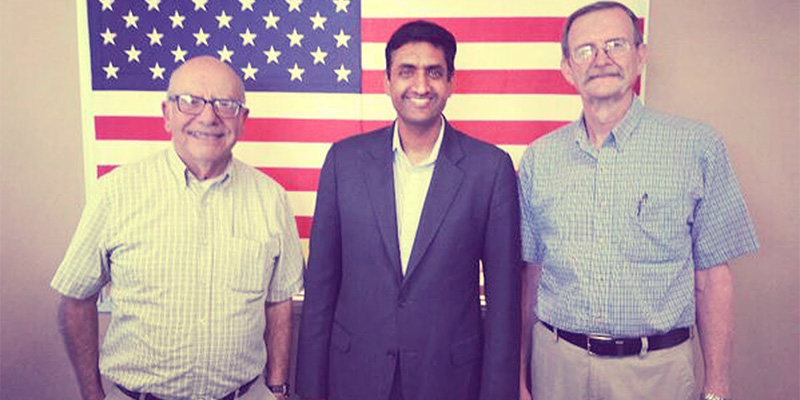
My family’s history is similar to the story I’ve heard from many people in this district. When my parents came to America, it was with the commitment to work hard in the country that guaranteed them economic opportunity. As a substitute teacher in public schools, my mother helped motivate the next generation to succeed; as a chemical engineer, my father pushed progress in technical innovation. But the biggest reason my parents wanted to come to the United States was their hope of creating a better future for my brother and for me. From the time we were very young, my parents emphasized the importance of hard work and public service.
America is the only place I’ve ever known, and I believe in the unalienable rights defined by our founding fathers. I was lucky enough to be born here in the United States, so citizenship was never something I worried about. But I can empathize with how it must feel to be an American in spirit – but to not be a citizen based on birthplace. We have an economic and moral obligation to give DREAMers a pathway to citizenship.
Immigration reform and economic growth go hand in hand. Immigrants have been essential to Silicon Valley’s innovative and meritocratic ethos. They have founded 40% of the companies in the tech sector that were financed by venture capital and then went public in the United States – including Yahoo, eBay, Intel, and Google – creating jobs and making our business culture more dynamic. To continue as the world’s incubator for innovation, we need to encourage the most talented and motivated people to locate here in Silicon Valley.
Champion Comprehensive Immigration Reform
Reinstate DACA and give DREAMers legal status right away. In 2012 President Obama implemented DACA, a deferred action program, which offered a two-year reprieve from the threat of deportation to young adults. That’s a band-aid measure on an issue that is affecting millions of hardworking and law biding residents of this country. Congress needs work together and pass legislation to give young adults the ability to quickly receive provisional legal status, allowing them to live and work freely in this country, and streamline the process of applying for a green card, permanent legal residency, and finally citizenship.
Implement a pathway to citizenship for adults. There are 11 million undocumented immigrants living in our country who work in a variety of industries that boost our economy. They pay sales taxes – many also pay income taxes, and other federal, state, and local taxes. Estimates show that undocumented immigrants pay about $7 billion into Social Security.
Immigrants who have already contributed so much to our country and want to become citizens should be able to do so. They should be granted provisional legal status, putting them on the road to receiving a green card and U.S. citizenship. It’s not only our moral obligation, but also an economic imperative.
Protect family reunification visas. While the passage of the Senate’s bipartisan bill is commendable, I am disappointed that family reunification visas were not included. Family reunification is a long-standing policy of the U.S., and the removal of sibling visas and reduction of adult married children visas is an unnecessary hit to hardworking families of the 17th district who want to unite with their loved ones here in America.
Implement a guest worker visa. Having a strong contingency of workers is essential for our country’s success, and I commend the provision in the Senate bill that grants visas to 200,000 low-skilled workers per year to fill construction, long-term care, and hospitality jobs. Additionally, the bill does right by agriculture workers who have already worked in the industry for at least two years by letting them apply for green cards in five years if they continue working in our country’s breadboxes.
Provide political asylum for emigrants. Since World War II, more refugees have come to the United States seeking protection than to any other country – two million have arrived here just since 1980. Our nation was founded on the ideal that everyone is created equal, and our willingness to take in and provide shelter to those facing persecution based on race, religion, nationality, or political opinion reinforces the United States as a beacon for freedom.
While it is important to retain our standard of granting refuge to those able to demonstrate a well-founded fear of persecution in their home country, we should also cut the bureaucratic inefficiency from the asylum process. We should eliminate the one-year deadline for filing an asylum application and expand who is qualified for “derivative” asylum status to include the children of the spouse in addition to the grandchildren of the individual given asylum. These changes would extend our capacity to improve human rights to individuals around the world who suffer at the hands of unjust governments and state actors.